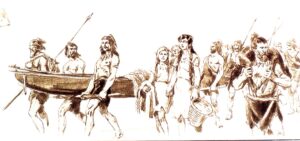
I’m interested in the relationship between people and the sea. Perhaps it is something to do with living on an island and looking out at the sea every day. And with my research interests in hunter-gatherers and their mobility.
Visiting a local exhibition by Patty and Ralph Robinson on ‘Allegories of Migration’ in aid of the Scottish Refugee Council, I was very struck by some of the pieces and the thoughts they inspired. What role, for example, will the current sea-crossings in the eastern Mediterranean play in the stories that are told hereafter? Although we often see the sea as a boundary (we are an island nation after all), in many of our stories journeys across the sea act as gateways to adventure. Of course the classic tale is the Odyssey, but the theme holds good closer to home as well. From the the account of Rognvald’s journey to the Holy Land in the Orkneyinga Saga to Treasure Island, there is something about setting out by boat that we know in advance will serve to test our abilities with the possibility of great reward at the end.
But reading these stories at home is a very safe pastime. We rarely think of them as threatening. Perhaps we should. I listened fascinated (and horrified) to an interview on Radio Four the other day as a Syrian refugee family spoke calmly of the boat crossing they were about to make, of the fact that the boat would be sunk before they reached land, and of the fact that most of them could not swim. The dangers are huge. And yet the reward is so great, and their present situation so bad that the chances of being rescued make the journey worthwhile.
I wonder about the sea stories told by our Mesolithic ancestors. And whether the crossing of water has always been so laden. I suppose it probably has, from the moment we left Africa. It is very easy to be lulled into a false sense of security today, when one has a warm fire, a mug of tea and a good book. Even more so when our sea crossings are done in the comparative comfort of a modern ferry. Few of us in the UK set out across water in the knowledge that we might not return, or make it to the other side. Perhaps we should look differently at our tales of the sea and the way in which we write about past sea crossings, and we should remember that it has not always been so.
You must be logged in to post a comment.